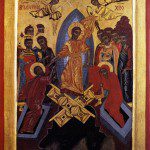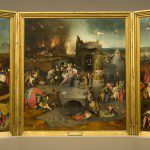The best leaders, the best forms of government, are those who have power and authority but do not have to use it; it is found in those who guide others to what is good, and then give those under their authority the chance to follow that guidance for themselves. If God sees the need to interact with his creation, to provide guidance to some particular person, or some community as a whole, he will do so, but most of the time he lets nature take its course and serve as the means by which his providence is felt. For providence is hat which sustains the world and all that is within it, so the nature of the world is itself the normative means by which providence is felt.
![Triumph of Divine Providence by Pietro da Cortona [CC BY-SA 4.0 (http://creativecommons.org/licenses/by-sa/4.0) or CC BY-SA 4.0 (http://creativecommons.org/licenses/by-sa/4.0)], via Wikimedia Commons](https://wp-media.patheos.com/blogs/sites/637/2017/04/Ceiling_of_Palazzo_Barberini-171x300.jpg)
Now, the Maker of existing things must be the same as their Provider, for it is neither fitting nor logical that one should be their creator and another their provider, because in such a case they would both be definitively wanting – the one in the matter of creating and the other in that of providing. Hence, God is both Creator and Provider, and is power of creating, sustaining, and providing His good will. [3]
Providence, then, is seen in and through the sustaining of creation, of providing a stage for actors, those creatures of God given a will of their own, to choose for themselves how they will act (however great or small that choice is). This is why providence is said to make allowance not only for good choices, but bad, for the stage gives a lot of space by which people can act, showing once again how providence can be understood as that which preserves freedom instead of eliminating it from us. Providence comes out of God’s love for his creation, a love which has God make room for his creation instead of placing demands upon it, so that free will is affirmed and is not to be seen as an illusion, which is why St John of Damascus was able to say, “Some things that are due to providence are by approval, whereas others are by permission.”[4]
For those who love God, his providence provides them the means to interact with his bountiful grace, giving them grace upon grace, opportunity upon opportunity. The more someone freely joins themselves to God’s bounty, the greater and more extraordinary the possibilities which lie before them, each one working for the good of those who accomplishes such tasks. “We know that in everything God works for good with those who love him, who are called according to his purpose” (Rom. 8:28 RSV). But on the other hand, no one is left without opportunity to receive God’s blessings, so that even those who have turned their backs on God find God has not turned his back from them and he continues to offer them his love. Indeed, as Theodoret of Cyrus indicated, some blessings are given to all, so that by some of the simplest elements of providence, we have an opportunity to look up in wonder and find our way back to God’s good graces:
Each of the blessings enumerated makes a contribution to you, offering services as a sort of tribute. The sun gives its light and hat and ripens the fruits of the earth. The moon is your lamp at night. On land stars show you the night time; they also signify the changes of the seasons; on the sea they are guides to the mainland.[5]
All things are tied together by God’s providence, as St. Thalassios proclaimed. “God, who gave being to all that is, at the same time united all things together in His providence.”[6] The good which God gives to one person is to be united to the good given to another person, or even the good given to a particular place or thing in creation. Each person, each thing, with its grace, has a gift which they can share with others and unite themselves with others. What is good can be shared by all, but what is bad or evil, will likewise, affects others through the interdependent relationship we have with each other. Grace and sin both have communal qualities because of the oneness by which God has established and tied creation together. To deny this is to deny how God works in and through his providence. “For the Creator directs creation and has not left the ship of His making without a pilot, but is Himself both the shipwright and the One who planted the raw material, both causing it to grow and building the vessel, and He continues to hold the rudder.”[7] God is, then, the captain directing the ship of creation in the sea of time:
Again, one preparing to sail and about to voyage over raging waves calls upon a piece of wood more fragile than the ship which carries him. For it was desire for gain that planned that vessel, and wisdom was the craftsman who built it; but it is thy providence, O Father, that steers its course, because thou hast given it a path in the sea, and a safe way through the waves, showing that thou canst save from every danger, so that even if a man lacks skill, he may put to sea (Wis. 14:1-3 RSV).













